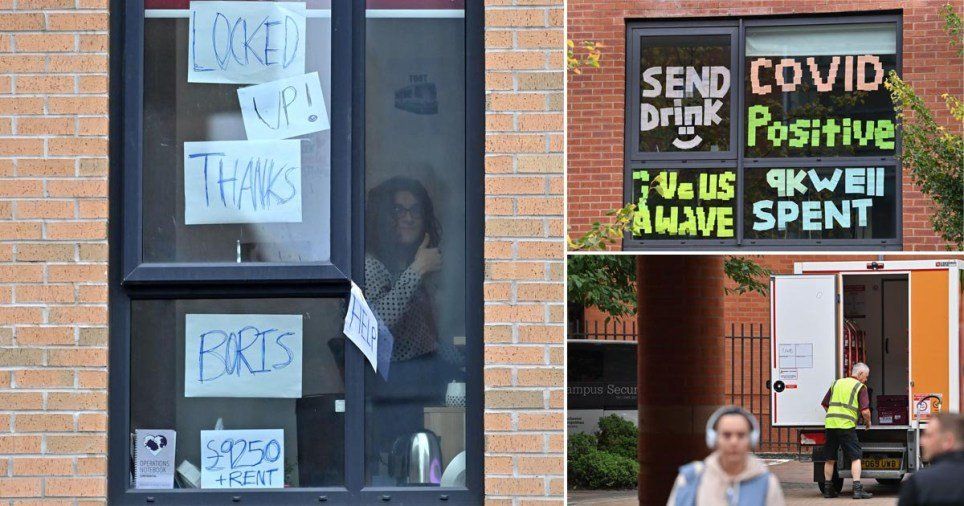We need to talk about students
Locked up and let down or paying the price for partying? Britain talks about students.

Students have returned to Britain's universities and predictably this has been met with a spike in coronavirus infections.
Outbreaks have been seen at many universities but most notably in Glasgow, Edinburgh, Manchester, Liverpool, Newcastle, Northumbria and Swansea.
For many, particularly first year students, what should have been the start of a life-enhancing experience has instead turned into a nightmare of restrictions, lockdowns and having to isolate with people they barely know.
News media have carried stories of the outbreak, highlighting the restrictions and quite often the humour that goes with it - most papers carried photographs of banners asking for beer and other student essentials to be sent. Not everyone has been supportive though with quite a few vox pops blaming the students themselves for partying and ignoring restrictions on meeting up indoors.
What then is the sentiment towards students and the restrictions they face? To find out we undertook a topic and sentiment analysis of over 6,000 tweets (and retweets) that specifically mentioned universities and coronavirus restrictions. The tweets covered the period from 21st to 28th September when reporting of the university outbreaks was at its highest. We stripped out tweets that were not about UK universities but left in those that compared the UK situation with other universities around the world.
The analysis was undertaken in-house using our own text analysis tool. This uses natural language programming and machine learning to identify topics from large datasets of unstructured text. We then undertook a qualitative analysis of the data to get under the skin of what people are really talking about.
What are you talking about?
We identified four main topics of conversation:
- The impact on the health and wellbeing including financial wellbeing of students.
- The science behind the restrictions
- Government Covid-19 policy and how it is communicated
- International comparisons with other universities
The most talked about by far is the impact of restrictions on students' health and wellbeing as the graphic below shows.
Health and wellbeing
Over two-thirds of the conversation concerns the effect of the restrictions on mental health, anxiety and stress levels. Particular concern is expressed for first years who may have to self-isolate with people they have only just met. Commentators picked up on the uncertainty of what university life will be like this academic year. Learning may be more fragmented. Students might not be allowed home for Christmas, social interactions will be limited, the opportunity for friendships, shared experiences and being part of society may be curtailed. It was pointed out that many students work part-time in order to make ends meet while studying but jobs have gone in the pandemic, leading to increased financial worries.
It is felt that the current situation will have a significant impact on the mental health of many young people.
Another strong theme within this category is that of fairness both in relation to financial fairness but also a sense of a social injustice. Students (in England) are having to pay over £9,000 in tuition fees and take out student loans to cover accommodation and living expenses. Going to university is an expensive business and students should expect to receive value for what they are paying for. Allied to this is an argument that universities have been eager to see students return for the tuition and accommodation revenue they bring in.
It is thought that being stuck in halls with lectures almost wholly online does not represent value and therefore many tweets call for students to be given refunds on their hall costs, tuition fees or both. It is pointed out that Glasgow is refunding some rent costs and other universities should take their lead.
There is also a sense that the situation with students represents a social injustice. When they signed up for university they signed up for the whole experience - learning, developing as a person, meeting new people, experiencing new things and yes socialising. The restrictions are having a negative impact and following so closely on the A level crisis in the summer, means some students are being hit hard twice.
Many tweeters talk about their own experience at university how the current student cohort suffers by comparison. Tweeters also point out that young people face a difficult job market and this, added to the debt from doing a degree, plus Covid-19 restrictions mean that it will not be a good time for young people into the foreseeable future.
It's not all supportive though. There is a view that rule breaking and lack of social distancing has led to restrictions being imposed. Students, the argument goes, only have themselves to blame. Similarly, some tweeters question why students have returned to universities in the first place. They must have known that cases would spike as a result. The sensible thing would have been to stay at home.
There is also a lot of humour from students and other commentators throughout the conversation. There is talk of remaking Die Hard where Bruce Willis has to rescue his daughter from university lockdown. References to emergency supplies of beer and food are made as well as middle class parents parachuting in Waitrose survival hampers.
International comparisons
The conversation contains some interesting comparisons on how universities around the world have reacted to the pandemic. There are some similarities to the UK in relation to the move to mainly online learning and the associated need for training and support for teaching staff to deliver education in a new way. Related to this, are examples where universities encouraged students, especially international ones, to stay at home and learn remotely. Learning has been augmented through the use of video tutorials, email contact and WhatsApp groups.
There were examples where universities were still doing some face to face learning but these had been scaled right back and strict social distancing measures introduced.
Other examples included having virtual campus tours rather than open days, allowing deferments for a year and channelling extra resources into outreach work to try to prevent students dropping out due to distress.
Lockdown science
Tweets in this topic quoted an interview with Professor Mark Woolhouse from Edinburgh University, who is also a member of Sage, the government advisory body. Professor Woolhouse said that lockdown was an unproven policy that only defers the spread of the virus rather than eradicates it. Reference was also made to academics from Harvard and Stanford universities who argue for age-related measures rather than total lockdowns.
Sweden came up a lot in the conversation and how their approach to the pandemic was different. Questions were asked about why the UK does not follow it, although it is clear that some people do not realise that the Swedish approach is more nuanced than their understanding of it.
Government policy
Tweets in this topic focus on the government's response to the pandemic in general and the university situation in particular.
There is criticism over perceived failures of Test and Trace, references to Dominic Cummings and his trip to Barnard Castle giving students a ready-made excuse to ignore restrictions, as well as more general references to 'chaos' in the government's response to the university situation. This relates to a perceived lack of planning and lack of clarity in communications. A clear sentiment in this category is that students have been 'hung out to dry' by the government (and universities) and that much greater financial and emotional support is needed.
The notion that students might be locked down for Christmas attracts criticism over its fairness and whether students and their parents will actually comply with it. Much of the blame for the 'crisis' is pinned firmly on Gavin Williamson (Education Secretary) and Matt Hancock (Health Secretary).
Key take-outs from the analysis
The analysis of tweets has shown the breadth and depth of the conversation on student restrictions at university. Much of what was found could have been predicted - the debate about mental and financial wellbeing, the effectiveness of lockdown and the criticism of the government response, are not a surprise. No surprise too is the sentiment that student actions contributed to the restrictions.
Not all findings are predictable though. The analysis shows how much people are prepared to engage in debate and highlight examples of good practice and experience from universities around the world.
One of the most unexpected findings is the sense from many tweeters (and not just students) that young people are on the receiving end of a social injustice. An experience that should be about self-discovery, expanding horizons, learning and independence has turned into a dystopian nightmare. The public seem to have latched on to this unfairness. Sometimes it is used as a stick with which to beat the government but for the most part people have shown genuine empathy and understanding towards young people.
In a society that is increasingly being defined along binary lines (left v right, old v young, us v them), it is good to see an example of people coming together to speak out against unfairness.










